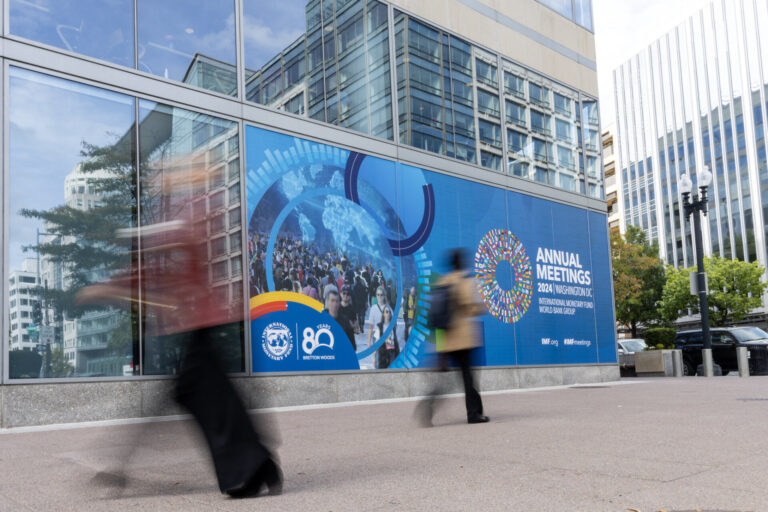G20 finance ministers and central bank governors held their final meeting of the year on 23-24 October 2024, during the annual meetings of the International Monetary Fund (IMF) and the World Bank Group. The two leaders’ last meeting came as part of preparations for COP29 in Baku and the G20 summit in Rio de Janeiro, where governments will negotiate new collective quantitative targets (NCQGs) on climate finance.
The series of documents issued after the meeting included several notable developments, summarized below. This builds on E3G’s previous blog outlining the achievements of multilateral development banks (MDBs) at last week’s annual meeting. [The Finance Ministers’ Communiqué and its Annex are here, while the Ministerial Statement and Outcome Document from the Task Force for the Global Mobilization Against Climate Change (TF CLIMA), a collaboration between Finance and Climate Ministers, are here.]
International Financial Architecture (IFA) Reform
G20 finance ministers have made significant progress in reforming the entire international financial architecture, from multilateral development banks (MDBs) to the IMF and financial regulation. The Communiqué covers a wide range of climate-related topics, including recognizing the macroeconomic and distributional challenges of climate change and proposing a range of positive actions.
MDB resources and strategies
G20 Finance Ministers committed to reviewing MDB resources and strategies and measuring progress against the new MDB Roadmap. The Communiqué tasks the IFA Working Group with establishing a monitoring and reporting process to review progress.
G20 ministers called for further reforms to the Capital Adequacy Framework (CAF), opening the door to new capitalization for MDBs in principle. However, it fell short of making concrete commitments for new financing, and did not adopt the goal of tripling MDB financing by 2030, as previously recommended by the G20 Independent Expert Group. Further steps, combined with improved financing conditions, would significantly increase confidence in the G20 among developing countries.
Fiscal space and transition financing
Creating additional fiscal space to finance the transition to a low-carbon economy in emerging market and developing economies (EMDEs) requires sustained efforts by leaders with the support of finance ministers. The finance ministers’ communiqué includes measures to address debt vulnerabilities that could make it difficult for countries to access additional financing to invest in climate change and other development goals. Streamlining innovative debt solutions such as debt-to-climate swaps and climate-resilient debt clauses could be an option to help free up fiscal space for EMDEs.
The communiqué also discussed promoting international tax cooperation, including dialogue on the taxation of the ultra-wealthy.
Expect to see more on both themes in 2025, as there are early indications that South Africa will prioritize these themes in its next G20 Presidency.
Financial framework and transition plan
The overall message from TF CLIMA was that a financial framework that combines global financial stability with increased capital flows from developed to developing countries is possible.
Based on this holistic approach, the TF CLIMA outcome document and accompanying ministerial statement, together with the report of the Sustainable Finance Working Group, provide the following overarching principles:
Transition planning at the national level. Designing a national platform to coordinate investments in national transition plans. Private sector transition planning. It is based on standards and framework work produced by ISSB, GFANZ, and TPT.
Looking to the future
The 2024 final publication of G20 finance ministers, including the results of TF CLIMA, shows that climate change is increasingly seen as a macroeconomic issue. It is also clear that the Minister of Finance recognizes this and is committed to implementing the tools at his disposal.
But with negotiations on new joint quantitative targets for finance scheduled for November in Baku alongside the G20 summit in Rio, key questions remain. This momentum is fast enough to enable agreement on new fiscal targets in Baku this year, providing a springboard for important reform steps agreed by leaders when setting next year’s agenda. Or? South Africa and Brazil will work together in the upcoming G20 and COP30 presidencies to further accelerate this agenda in 2025, so ensuring the G20’s answer is ‘yes’ will be a key challenge.


